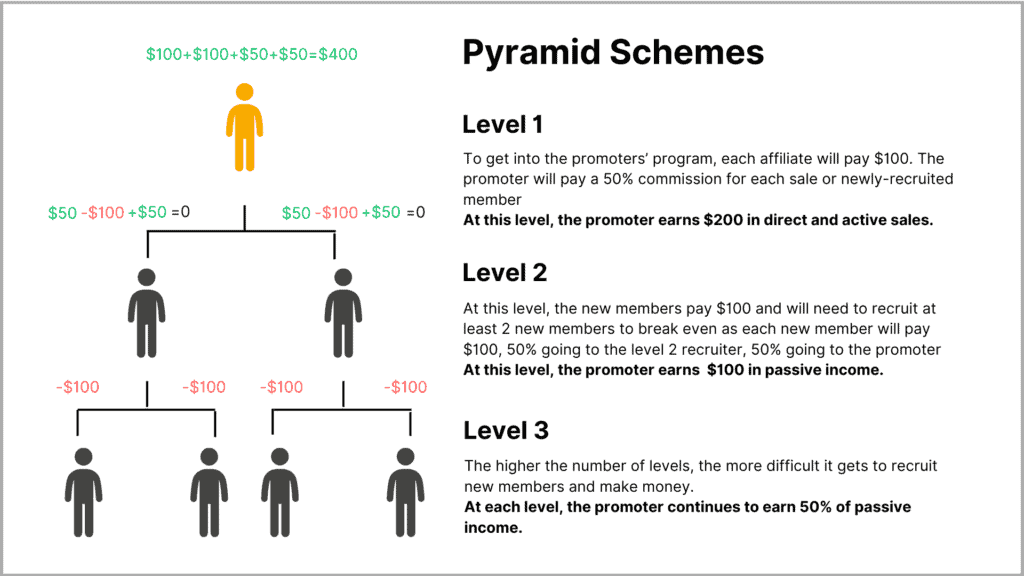Affiliate Marketing is NOT a pyramid scheme.
Affiliate marketing has become a popular avenue for individuals and businesses looking to generate income online.
In our article about the top affiliate marketing stats and trends to monitor in 2025, we discussed the opportunity and upward trends of the Affiliate Marketing Industry which is worth over $16 Billion and is expected to grow to $38 Billion by 2030.
This only includes the affiliate marketing ecosystem, part of a $63 billion industry – Partnership Marketing.
However, the industry often faces scrutiny with claims that the model resembles pyramid schemes, like in other industries such as finance.
Therefore for the 16K+ annual online searches from users asking “Is Affiliate Marketing a Pyramid Scheme?”, we will review what are the misconceptions and shed light on what is a pyramid scheme, what is affiliate marketing, and why affiliate marketing is NOT a pyramid scheme.
What is a pyramid scheme?
A pyramid scheme is a fraudulent business model that operates on the principle of recruiting participants into the scheme with the promise of high returns, primarily based on the recruitment of others rather than the sale of products or services.
It is characterized by a hierarchical structure resembling a pyramid, where the initial recruiter sits at the top, and subsequent participants form layers beneath.

For example;
A promoter focuses on recruiting “affiliates” to make money using deceptive marketing strategies that promise high returns and quick and easy money.
To get in, new members need to pay $100 to the promoter and for each new member they will recruit, they will make 50% for each sale or newly – recruited member.
- Level 1 – the promoter makes $200 for recruiting 2 members and an additional $100.
- Level 2 – every time a new member recruits a member, they will earn a $50 commission, and the promoter will earn $50 as well
- Level 3 – every time a new member at this level recruits a new member, they will earn $50 in direct commission and the promoter will earn $50 in passive income per new recruiter
- And the model goes on
Therefore, the higher the number of levels, the more difficult it becomes for affiliates to make money because, within any given niche or market, there will be a limited amount of people to recruit into the model. While most recruiters in this model are losing money, the promoter continues to earn commissions as long as there are people to be recruited.
Pyramid schemes typically collapse when recruitment slows down, leaving those at the bottom with financial losses.
Understanding this model is crucial for drawing distinctions between legitimate affiliate and MLM business models and potential pyramid schemes and scams.
What is affiliate marketing?
Affiliate marketing, on the other hand, is a legitimate and widely accepted business model. It operates on a performance-based commission structure, where affiliates earn a commission for driving sales or leads to a merchant’s products or services, and for using an affiliate link that allows them to track and compensate them for the successful referred action.
The key players in affiliate marketing include the merchant, who owns the product or service, the affiliate who promotes it, and the consumer who makes a purchase.
In affiliate marketing, the focus is on promoting valuable products or services, and commissions are earned based on actual sales or leads generated. This stands in stark contrast to the recruitment-centric structure of pyramid schemes.
An affiliate marketing program relies on recruitment activities that consist of sourcing and finding the best affiliate partners, publishers, influencers, and affiliate marketers, to support the growth of the program.
The suspicion of scams or pyramid schemes would happen on the merchant’s side, using affiliate marketing to recruit partners for products or services with low to no value, and sometimes, with no products or services to offer!
Such deceptive marketing strategies could happen in the affiliate industry and in lead generation and B2B rather than in the consumer brands or retail space, where it gets difficult for scammers to fake offers and promise excessively high commissions.
Key Differences Between Affiliate Marketing and Pyramid Schemes
There are key differences between affiliate marketing and pyramid schemes;
Structure and Hierarchy Comparison
In a pyramid scheme, the structure is hierarchical, with participants at the top benefiting the most. The scheme is mostly based on the recruitment focus of new members who are also encouraged to recruit additional participants, every time forming a new level in the pyramid.
90% of participants in pyramid schemes will lose money.
In affiliate marketing, the structure is more horizontal, with affiliates earning based on their performance, irrespective of when they joined the program.
Some affiliates and publisher groups such as sub-networks earn commissions and/or revenue share by giving access to merchants’ offers to other affiliates – called sub-affiliates. It has nothing to compare with the pyramid scheme structure though.
Revenue sources and legitimacy
Pyramid schemes rely heavily on recruitment fees for revenue, and their sustainability is questionable at best. In contrast, affiliate marketing relies on the sale of genuine products or services, ensuring a legitimate and sustainable source of revenue for all parties involved.
One common misconception is that both involve a tiered structure, but as discussed earlier, the key lies in the nature of the revenue source and the focus on actual product or service promotion.
Saturated markets and high return promises
People who think affiliate marketing is a pyramid scheme tend to think that the potential for affiliate marketing to become saturated limits the earning potential for new entrants.
However, the vastness of the online market and the continuous introduction of new products and services provide opportunities for affiliates to carve out their niche.
The most successful and legitimate affiliate marketers are usually experts in specific niches or industries and keep a close watch on emerging trends to build authority and advocate for products and services they know are the right solutions for their audience.
Finally, in a pyramid scheme model, participants are typically promised significant financial gains with minimal effort, enticing them to join the scheme. These promises are often unrealistic and depend on continuous recruitment to sustain the model.
How to avoid pyramid schemes?
If you have doubts about a business, an affiliate program, or affiliate marketer promoting high-ticket affiliate marketing products and promising to help you build a successful online business in no time, take a step back and assess whether or not this is a pyramid scheme:
- Understand the business model. With this article, you have the basics to understand the distinctions between affiliate marketing and pyramid schemes.
- Check for the tangible value of the products or services offered. Are these products or services genuinely promoted?
- Thoroughly research the company before getting involved. Look for reviews, testimonials, and feedback from other affiliates. Legitimate programs have a transparent history and positive reputation.
- Clarify the revenue source; legitimate affiliate programs generate revenue from the sale of products or services. Be cautious if the primary emphasis is on recruitment, and participants are required to invest money without a clear product or service being exchanged.
- Examine the compensation structure to understand how you will earn commissions. In legitimate affiliate marketing, commissions are earned through the successful promotion and sale of products or services. Pyramid schemes often promise high returns based on recruitment, not sales.
- Be cautious about pressure tactics to recruit others quickly or invest a significant amount of money upfront. Legitimate affiliate programs allow you to take your time, understand the business, and make informed decisions.
- Ensure the program provides transparent information and complies with legal standards, such as the ones from the Federal Trade Commission (FTC).
- Consult with experts such as our team at The Good Strategy or seek advice from other experienced affiliate marketers or industry experts. We can offer insights, share our experiences, how to spot scammers and help you identify legitimate opportunities from potential scams.
Final Verdict – Is affiliate marketing a pyramid scheme?
Affiliate marketing is NOT a pyramid scheme. It is a legitimate business model.
Both affiliate marketing and pyramid schemes are distinct models with fundamental differences in structure, revenue sources, and legitimacy. It is essential to approach these concepts with a clear understanding of their definitions and characteristics to make informed judgments.
However, in many sectors or industries where financial gains are involved – such as in the Your Money Your Life (YMYL) niche, there will always be get-rich-quick schemes making money online building deceptive tactics to take advantage of others.
Therefore, we could assume that some affiliate marketers may make a living with pyramid schemes to build passive income, pretending to be affiliate marketers or gurus, holding false promises of high returns for their “followers”.
This is by no means the right representation of the growing affiliate marketing industry, a sector with many opportunities whether from a publisher, merchant, or affiliate network perspective.
As individuals navigate the online landscape, they should be aware of red flags, conduct thorough research, and choose reputable affiliate programs that align with ethical business practices.
Affiliate marketing, when done right, provides a legitimate and sustainable way for businesses and individuals to earn commissions – and make a living – while promoting valuable products and services that will help solve real problems.
Your Success Starts with The Good Strategy!












